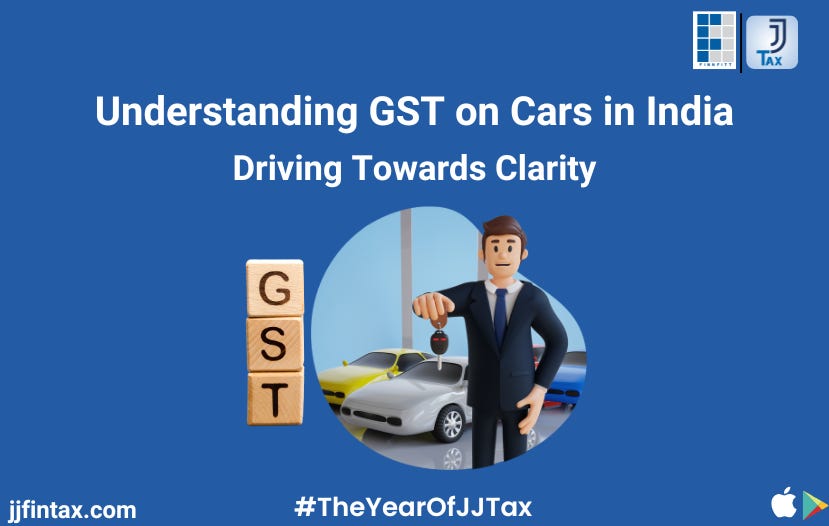Driving Towards Clarity🚘

In your dreams, buying a car is all speed and style. There’s hardly any tedious paperwork or tax hassles to contend with! But in reality, the road to owning your dream car runs straight through India’s GST rules. Let us have a quick look at how GST is levied on cars in 2025.
Before GST, buying a car meant paying a series of overlapping taxes that differed from state to state. Excise duty, auto cess, NCCD, VAT, CST, and road tax all applied separately, often leading to a cascading effect where tax was levied on tax. For example, small petrol cars under 1200cc faced a total indirect tax burden of about 28–30%, while larger vehicles and SUVs could attract as much as 48–50% due to luxury and infrastructure levies.
GST replaced multiple central and state taxes with one unified framework, allowing manufacturers to claim input tax credit (ITC) on components and logistics. However, cars were classified as luxury goods and placed in the highest 28% GST slab. To offset revenue losses for states, an additional Compensation Cess of 1–22% was introduced, depending on the car’s size and engine capacity. This brought the effective tax rate for most cars to between 29% and 50%.
In the years following the rollout of GST, the government and the GST Council refined tax rates for specific vehicle categories. While the overall structure remained the same, electric and hybrid vehicles received significant relief to encourage clean mobility. The GST on electric vehicles was reduced to just 5% in 2019, making them one of the most tax-efficient automotive segments. Meanwhile, small petrol and diesel cars continued to attract around 29–31% tax, while mid-sized and luxury vehicles stayed in the 43–50% range.
In its 50th meeting in July 2023, the GST Council issued a landmark clarification redefining “Utility Vehicles.” Earlier, only SUVs above a certain engine size attracted the highest cess, but the revised definition now covers all vehicles exceeding 4000mm in length, 1500cc engine capacity, and 170mm unladen ground clearance. This change expanded the cess applicability to include MUVs, crossovers, and some premium hatchbacks, standardising the tax treatment across similar vehicle categories.
As of 2025, India continues to operate under a simplified dual tax structure for automobiles. Small cars (under 4000mm, with smaller engines) attract a total effective GST of around 29–31%, while mid-size, luxury, and UV segments face rates of up to 45–50%. Electric vehicles remain taxed at a flat 5%, and hybrid cars are taxed between 12–18%, depending on their powertrain.
|
Category |
GST Rate |
Key Conditions |
|
Small Cars (Petrol/CNG/LPG) |
18% |
Engine ≤ 1200 cc and length ≤ 4000 mm |
|
Small Cars (Diesel) |
18% |
Engine ≤ 1500 cc and length ≤ 4000 mm |
|
Mid-size, Large Cars & SUVs |
≈ 40% (flat) |
Exceed above limits; cess merged into GST |
|
Electric Vehicles (EVs) |
5% |
Applies to all EV passenger cars |
|
Hybrid Cars (within small-car limits) |
18% |
If specs exceed limits, taxed at ~40% |
So, while smaller hatchbacks like the Tata Tiago or Maruti Swift enjoy the lower 18% rate, premium sedans and SUVs such as the Toyota Fortuner or BMW X5 fall under the higher 40% category.
For automobile dealers and importers, GST brought one significant advantage:
They can claim Input Tax Credit on the GST paid on imported or purchased vehicles (for resale) and on most associated business expenses. Also, stock transfers between branches in different states now fall under Integrated GST (IGST), which maintains credit flow. However, ITC is restricted if the vehicle is purchased for personal or non-business use, or for providing passenger transport services, unless specifically allowed under the GST law.
The 50th and 56th GST Council meetings brought much-needed clarity to the automobile segment. Here are the key takeaways :
1. Small Cars (≤ 4 m length, ≤ 1200 cc petrol / ≤ 1500 cc diesel)
→ 18% GST
2. Utility Vehicles (SUVs, MUVs, larger sedans)
→ ≈ 40% GST flat, no separate compensation cess.
Vehicles exceeding 4 m in length, with engine capacity ≥ 1500 cc, or ground clearance ≥ 170 mm fall under this category.
3. Electric Cars (EVs)
→ 5% GST — unchanged, to encourage adoption of sustainable mobility.
4. Hybrid Cars
→ If they meet “small car” parameters — taxed at 18%, else ~40%.
The implementation of GST reshaped how India taxes cars by merging complexity into clarity. It did away with the cascading taxes into a single system.
While the numbers may shift as the market evolves, one thing is certain: GST has aligned the country’s automotive tax policy with global best practices. That being said, the devil is in the details, which require scrutiny.

